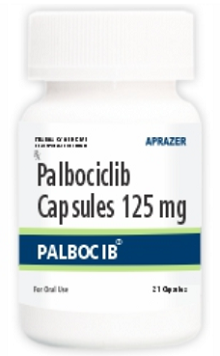How Long can you Live with Metastatic Breast Cancer?

Table of Contents
Palbocib-125 – Metastatic Breast Cancer
 Metastatic breast cancer is a severe form of cancer. In recent years, new medications, such as Palbocib-125, have been developed that have improved survival rates and quality of life for some patients.
Metastatic breast cancer is a severe form of cancer. In recent years, new medications, such as Palbocib-125, have been developed that have improved survival rates and quality of life for some patients.
Survival rate and health outcomes
According to a survey, about 28 percent of women having this cancer may survive for five years or less.
However, survival statistics are based on huge groups of individuals and might not properly predict the progress of the person. Every patient is unique, and factors such as reaction to treatment and overall health can dramatically affect their life expectancy.
Methods of Treatment:
Proper treatment can reduce the growth of cancer cells and health problems and improve physical and mental issues. The methods to reduce cancer cells include chemotherapy, hormone therapy, or radiation therapy. Palbociclib is a drug that is often used in combination with other medicines to treat metastatic breast cancer.
Survival factors:
Many factors are essential for determining the life span of a patient. This factor includes the location of cancer, available treatment, the person’s age, and also the person’s medical history. Treatment plans should be different for every individual according to health disorders.
Treatment:
Palbocib-125 (Palbociclib) is a form of targeted medicine known as a cyclin-dependent kinase 4/6 (CDK4/6) inhibitor. It acts by blocking specific proteins that cancer cells need to divide and develop. Palbociclib is used to treat HR-positive, HER2-negative advanced, or metastatic breast cancer in conjunction with other therapies such as hormone therapy.
According to clinical trials, Palbociclib can considerably increase progression-free survival (PFS) in women with HR-positive, HER2-negative advanced, or MBC. PFS is the amount of time that cancer remains dormant or contained. In one research, the median PFS was 24.8 months for women who got Palbociclib with hormone therapy, compared to 14.5 months for those who received hormone therapy alone.
It is important to note that the median PFS is just an average, and individual outcomes may vary. Some women may experience prolonged PFS, while others may not respond as well to Palbociclib. As previously mentioned, age, health condition, and location can influence treatment.
In addition to enhancing PFS, Palbociclib has also been proven to improve overall survival (OS) in some clinical trials. OS is the length of time from the start of treatment until death from any cause.
In one study, women who received hormone therapy together with palbociclib had a median overall survival (OS) of 39.7 months as opposed to those who just received hormone therapy, who had a median OS of 29.7 months.
Palbocib-125 (Palbociclib capsules) are often well tolerated. However, it can cause low white blood cell counts, tiredness, nausea, and diarrhea. Patients should discuss their medical histories, such as disorders or allergies, to properly adjust their medicine dose.
Conclusion:
Palbocib-125 (Palbociclib) is not a cure for metastatic breast cancer. Palbocib-125 is vital to remember this. It is employed to control the condition and lengthen survival, but it is unable to entirely get rid of the cancerous cells. Cancer affects patients both physically and emotionally. Maintaining health conditions and spending time with family members and close friends influence mental conditions. Communicating with other patients about their thoughts and experiences can also help to support mental health. Good mental health also supports and comforts people with advanced cancer and their families.


 Anti Cancer Drugs
Anti Cancer Drugs Hepatitis C
Hepatitis C Meds for HIV
Meds for HIV Ayurvedic Medicine
Ayurvedic Medicine Transplant Medicine
Transplant Medicine Respiratory System
Respiratory System +91-9999064250 / 9811604424 / 9811604444
+91-9999064250 / 9811604424 / 9811604444
 8(800)100-47-90
8(800)100-47-90
